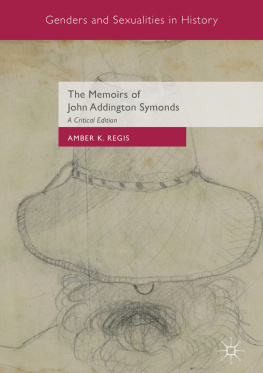JOHN ADDINGTON SYMONDS
LONDON
1896
TABLE OF CONTENTS.
| Chapter | Page |
| . |
| . | Christian Opinion from the Age of Justinian |
| . | Vulgar Errors |
| . | Literature: Pornographic and Descriptive :
Carlier, Les deux Prostitutions |
| . | Literature: Medico-Forensic : Tardieu |
| . | Literature: Medico-Psychological : Moreau, Tarnowsky,
Krafft-Ebing, Lombroso |
| . | Literature: Historical and Anthropological :
Meier, "A Problem in Greek Ethics"; Rosenbaum,
Bastian, Herbert Spencer, Sir Richard Burton,
Mantegazza |
| . | Literature: Polemical : Karl Heinrich Ulrichs |
| . | Literature: Idealistic : Walt Whitman |
| . | Epilogue |
| . | Suggestions upon Legislation |
BOOKS CONSULTED.
Gibbon's History of the Decline and Fall of the Roman Empire. Chapter XLIV.
F. Carlier. Les deux Prostitutions. Paris, Dentu, 1889.
A. Tardieu. Attentats aux Moeurs. Paris, Billire, 1878.
J. L. Casper and Carl Liman . Handbuch der Gerichtlichen Medicin. Berlin, Hirschwald, 1889.
J. L. Casper. Klinische Novellen. Berlin, Hirschwald, 1863.
P. Morrau. Des Aberrations du Sens Gntique. Paris, Asselin et Houzeau, 1887.
B. Tarnowsky. Die krankhaften Erscheinungen des Geschlechtssinnes. Berlin, Hirschwald, 1886.
Levy-Mnchen. Die Mnnliche Sterilitt. Berlin, Henser, 1889.
R. von Krafft-Ebing. Psychopathia Sexualis. Stuttgart, Enke, 1889.
Cesare Lombroso. Der Verbrecher in Anthropologischer, Aerztlicher und Juristischer Beziehung. Hamburg, Richter, 1887.
M. H. F. Meier. Pderastie. Ersch und Gruber's Allgemeine Encyclopdie. Leipzig, Brockhaus, 1837.
A Problem in Greek Ethics. No name or date. "Ten Copies printed for the Author's Use."
J. Rosenbaum. Geschichte der Lustseuche im Alterthume. Halle a. S., H. W. Schmidt, 1882.
Bastian. Der Mensch in der Geschichte. Leipzig, Wigand, 1860.
Herbert Spencer. Sociological Tables.
P. Dufour. Histoire de la Prostitution. Eight vols. Bruxelles, Rozey, 1861.
Sir R. F. Burton . Arabian Nights. Vol. 10. Benares, 1885.
P. Mantegazza. Gli Amori degli Uomini. Milano, 1886.
Numa Numantius ( K. H. Ulrichs ). Inclusa. Anthropologische Studien ber mannmnnliche Geschlechtsliebe. Leipzig, 1864.
Numa Numantius. Formatrix. Anthrop. Studien ber urnische Liebe. Leipzig, 1865.
Numa Numantius. Vindex. Social-juristische Studien ber mannmnnliche Geschlechtsliebe. Leipzig, 1864.
Numa Numantius. Vindicta. Kampf fr Freiheit u.s.w. Leipzig, 1865.
Numa Numantius. Ara Spei. Moralphil. und Socialphil. Studien ber urnische Liebe. Leipzig, 1865.
K. H. Ulrichs. Gladius Furens. Das Naturrthsel der Urningsliebe. Kassel, Wrttenberger, 1868.
K. H. Ulrichs. Memnon. Die Geschlechtsnatur des mannliebenden Urnings. Schleiz, H. Heyn, 1868.
K. H. Ulrichs. Incubus. Urningsliebe und Blutgier. Leipzig, A. Serbe, 1869.
K. H. Ulrichs. Argonauticus. Zastrow und die Urninge. Leipzig, A. Serbe, 1869.
K. H. Ulrichs. Prometheus. Beitrge zur Erforschung des Naturrthsels des Uranismus. Leipzig, Serbe, 1870.
K. H. Ulrichs. Araxes. Ruf nach Befreiung der Urningsnatur vom Strafgesetz. Schleiz, Heyn, 1870.
Walt Whitman. Leaves of Grass, in "Complete Poems and Prose." 1889-1890.
Walt Whitman. Democratic Vistas.
Nuova Codice Penale per il Regno d'Italia.
A. Coffignon. La Corruption Paris. Paris, La Librairie Illustre. 7th edition. No date.
INTRODUCTION.
T here is a passion, or a perversion of appetite, which, like all human passions, has played a considerable part in the world's history for good or evil; but which has hardly yet received the philosophical attention and the scientific investigation it deserves. The reason of this may be that in all Christian societies the passion under consideration has been condemned to pariahdom; consequently, philosophy and science have not deigned to make it the subject of special enquiry. Only one great race in past ages, the Greek race, to whom we owe the inheritance of our ideas, succeeded in raising it to the level of chivalrous enthusiasm. Nevertheless, we find it present everywhere and in all periods of history. We cannot take up the religious books, the legal codes, the annals, the descriptions of the manners of any nation, whether large or small, powerful or feeble, civilised or savage, without meeting with this passion in one form or other. Sometimes it assumes the calm and dignified attitude of conscious merit, as in Sparta, Athens, Thebes. Sometimes it skulks in holes and corners, hiding an abashed head and shrinking from the light of day, as in the capitals of modern Europe. It confronts us on the steppes of Asia, where hordes of nomads drink the milk of mares; in the bivouac of Keltish warriors, lying wrapped in wolves' skins round their camp-fires; upon the sands of Arabia, where the Bedaween raise desert dust in flying squadrons. We discern it among the palm-groves of the South Sea Islands, in the card-houses and temple-gardens of Japan, under Esquimaux snow-huts, beneath the sultry vegetation of Peru, beside the streams of Shiraz and the waters of the Ganges, in the cold clear air of Scandinavian winters. It throbs in our huge cities. The pulse of it can be felt in London, Paris, Berlin, Vienna, no less than in Constantinople, Naples, Teheran, and Moscow. It finds a home in Alpine valleys, Albanian ravines, Californian canyons, and gorges of Caucasian mountains. It once sat, clothed in Imperial purple, on the throne of the Roman Caesars, crowned with the tiara on the chair of St. Peter. It has flaunted, emblazoned with the heraldries of France and England, in coronation ceremonies at Rheims and Westminster. The royal palaces of Madrid and Aranjuez tell their tales of it. So do the ruined courtyards of Granada and the castle-keep of Avignon. It shone with clear radiance in the gymnasium of Hellas, and nerved the dying heroes of Greek freedom for their last forlorn hope upon the plains of Chronea. Endowed with inextinguishable life, in spite of all that has been done to suppress it, this passion survives at large in modern states and towns, penetrates society, makes itself felt in every quarter of the globe where men are brought into communion with men.
Yet no one dares to speak of it; or if they do, they bate their breath, and preface their remarks with maledictions.
Those who read these lines will hardly doubt what passion it is that I am hinting at. Quod semper ubique et ab omnibussurely it deserves a name. Yet I can hardly find a name which will not seem to soil this paper. The accomplished languages of Europe in the nineteenth century supply no term for this persistent feature of human psychology, without importing some implication of disgust, disgrace, vituperation. Science, however, has recentlywithin the last twenty years in factinvented a convenient phrase, which does not prejudice the matter under consideration. She speaks of the "inverted sexual instinct"; and with this neutral nomenclature the investigator has good reason to be satisfied.










